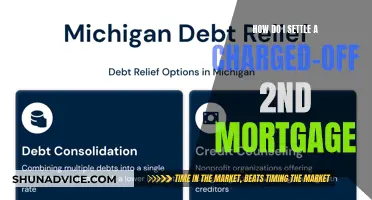
Taking out a mortgage is a huge financial commitment, and one that many people will be paying off for decades. However, there are ways to save money on your mortgage, from shopping around for the best rates to making extra payments. In this article, we'll explore some of the most effective ways to reduce your mortgage payments and save money in the long term. We'll also look at how to pay off your mortgage early and the potential benefits of doing so.
| Characteristics | Values |
|---|---|
| Payment frequency | Making fortnightly payments can add up to an extra payment per year, reducing the interest and building equity faster. |
| Extra payments | Making extra payments per month or one extra payment per year can help pay off the loan faster, saving on overall interest. |
| Refinancing | Refinancing can help secure a lower interest rate, but it may not be for everyone and requires closing costs. |
| Private Mortgage Insurance (PMI) | If you put less than 20% down on a conventional mortgage, you may be paying PMI. This can be cancelled once your mortgage balance is below 80% of the home's value. |
| Adjustable-Rate Mortgages (ARM) | If you don't plan to stay in the home long-term, an ARM may be cheaper than a fixed-rate mortgage due to initially lower interest rates. |
| Shopping around | It is recommended to compare rates and terms from different lenders to find the best deal. |
| Homeowner's insurance | Shopping around for a better insurance rate can help lower the overall monthly payment. |
| Dollar-a-month strategy | Increasing monthly payments by $1 each month can reduce the term of the mortgage. |
What You'll Learn

Make extra payments each month
Making extra payments each month can be an effective way to save money on your mortgage. By paying a little extra each month, you can pay off your loan faster and save a significant amount in overall interest.
One strategy is to make bi-weekly payments. Instead of making 12 monthly payments per year, you can make one payment every two weeks, resulting in 13 payments per year. This extra payment is applied to your principal, reducing the interest you pay over time. This strategy can be particularly effective if you have a long-term mortgage, as it can eliminate years from your loan.
Another option is to divide your monthly payment by 12 and then add this amount to your regular monthly payment. This approach will also result in an extra payment each year, helping you save money on interest and shorten your loan term.
If you receive any windfalls, such as tax refunds, bonuses, or raises, consider putting this extra money towards your mortgage. You can also increase your monthly payments by a small amount, such as $1, which can make a significant difference over time.
Before making extra payments, it is important to check with your mortgage company, as some may charge prepayment penalties. Additionally, ensure that your extra payments are applied to the principal balance and not the following month's payment.
By making extra payments each month, you can reduce the term of your loan, build equity in your home, and save money on interest costs.
Reaffirming Your Mortgage: Post-Bankruptcy Steps to Take
You may want to see also

Shop around for the best mortgage rate
Shopping around for the best mortgage rate is one of the most effective ways to save money on your mortgage. Even a slight difference in interest rates can translate to significant savings over the life of your loan. While lenders base their mortgage rates on federal rates, they have the discretion to set rates and some fees. Their products can vary, so it's important to do your research and compare different lenders' offerings.
When shopping around, collect quotes from at least a few mortgage lenders to ensure you get the best rate and terms possible. Be sure to compare loans with the same amount and loan term. You can also apply with a lender you already use for loans or banking. However, it is important to do cost comparisons to find the best deal.
If you're looking to lower your mortgage payment, keep an eye on the market and look for rates that are lower than your current interest rate. When mortgage rates drop, contact your lender to lock in your rate. Another way to get a lower rate is to buy down your rate with points. Mortgage discount points are prepaid interest paid as part of your closing costs, allowing you to get a lower rate. Each point is 1% of the loan amount, and generally, one mortgage point results in an interest rate reduction of 0.25% to 0.5%.
Additionally, consider the different types of loans available. For example, if you don't plan to stay in the home for a long time, an adjustable-rate mortgage (ARM) might be a better option, as the initial rate is usually lower than a fixed-rate mortgage. On the other hand, if you're looking for a longer-term loan, a 15-year loan might offer a lower interest rate than a 30-year loan, saving you money in the long run.
Strategies to Remove Private Mortgage Insurance from Your Home Loan
You may want to see also

Pay off your mortgage early
Paying off your mortgage early can be a great way to build wealth and save money. Here are some strategies to help you pay off your mortgage faster:
First, check with your mortgage company about any prepayment penalties or restrictions on making extra payments. Some companies may only accept additional payments at specific times, so it's important to clarify this before making any extra payments. Ensure that any extra payments are applied to the principal balance and not the following month's payment to reduce the term of your loan.
Next, consider increasing your monthly payments by a small amount, such as $1, to gradually reduce the term of your mortgage. You can also make extra payments each year by dividing your monthly payment by 12 and adding that amount to your regular monthly bill, resulting in one extra payment annually. This can help you save thousands of dollars in interest over the long run.
Another strategy is to put your extra income, such as bonuses, raises, or tax refunds, towards your mortgage. This can significantly reduce the principal balance and the overall interest you pay. Additionally, if you receive any cash windfalls or unexpected money, consider using it to make a lump-sum payment towards your mortgage.
Finally, if you have other debts, such as credit cards, car loans, or student loans, focus on paying them off first. This will free up more money each month to put towards your mortgage and help you achieve your financial goals faster.
Remember to shop around for the best mortgage rates and consider refinancing if interest rates drop significantly. By combining these strategies, you can pay off your mortgage early and save a significant amount of money.
Moving Your Mortgage: A Guide to Smooth Transitioning
You may want to see also

Reduce your interest rate
A lower interest rate can mean big savings on your mortgage. For example, on a $200,000 30-year fixed loan, reducing the interest rate by 1% can mean a monthly saving of almost $120.
If you're looking to lower your mortgage payment, keep an eye on the market and look for rates that are lower than your current interest rate. When mortgage rates drop, contact your lender to lock your rate. You can also pay to lock in an interest rate; you pay a fee to secure the rate you prefer. If rates rise before you close, you are protected, but if they drop, you won't be able to take advantage unless you have chosen a float-down option, which allows you to lower your locked-in rate to the current market rate.
You can also reduce your interest rate by buying down your rate with points. Mortgage discount points are prepaid interest paid as part of your closing costs to get a lower rate. Each point is 1% of the loan amount. For example, on a $200,000 loan, one point would cost you $2,000 at closing, resulting in an interest rate reduction of .25% to .5%.
If you're not planning on staying in your home for many years, an adjustable-rate mortgage (ARM) can save you money. The initial rate is usually lower than with a fixed-rate mortgage, and if you sell before the fixed-rate period ends, you'll save money.
You can also save money by paying off your mortgage early. Making an extra payment each year could reduce the term of your loan significantly and save you thousands in interest.
Removing a Name from Your Mortgage: What You Need to Know
You may want to see also

Refinance your mortgage
Refinancing your mortgage can be a great way to save money, but it is not for everyone. It is important to ask yourself a few questions to determine if refinancing is the right step for you. For example, how long do you plan to occupy the property? Will you save more money by refinancing?
Mortgage refinancing lets you save money or tap into equity, but it takes time to break even after upfront costs. Refinancing can cost between 5% and 7% of a loan's principal, and you will need to pay for an appraisal, a title search, and application fees. It is important to consider whether the savings will justify the expense.
One of the best reasons to refinance is to lower your loan's interest rate. If you can reduce your interest rate by at least 2%, refinancing is usually a good idea. A lower interest rate will save you money in the short and long term while reducing your monthly payments.
You can also use refinancing to change the terms of your loan or lock in a lower interest rate. You may be able to shorten the term of your loan, allowing you to pay it off sooner. A cash-out refinance is a way to tap into your home equity without selling your home, but this will increase your mortgage debt. With a cash-in refinance, you make a lump-sum payment to reduce your loan-to-value (LTV) ratio, which can lower your monthly payments and help you qualify for a lower interest rate.
If you are struggling to make your mortgage payments, your lender might offer you a short refinance. In this type of refinance, your new loan is lower than the original amount borrowed, and the lender forgives the difference.
Mortgage Freedom: Marking Your Loan as Paid Off
You may want to see also
Frequently asked questions
There are several ways to save money on your mortgage. Here are some options:
- Make extra payments each month to pay off your loan faster and save on interest.
- Shop around for the best mortgage rate and compare loans with the same amount and loan term.
- If you're not planning on staying in the home for long, consider an adjustable-rate mortgage (ARM) with a low initial rate.
- Pay off your consumer debt first, then focus on paying more towards your mortgage.
Aside from making extra payments, you can also increase your monthly payments by a small amount, such as $1, to reduce the term of your mortgage.
You can save money on interest by paying off your mortgage faster, either through larger or more frequent payments.
If you're paying for homeowners insurance as part of your monthly mortgage payment, shop around for a better rate. You could also be eligible for discounts based on security features in your home, your job, or by bundling your insurance policies.







